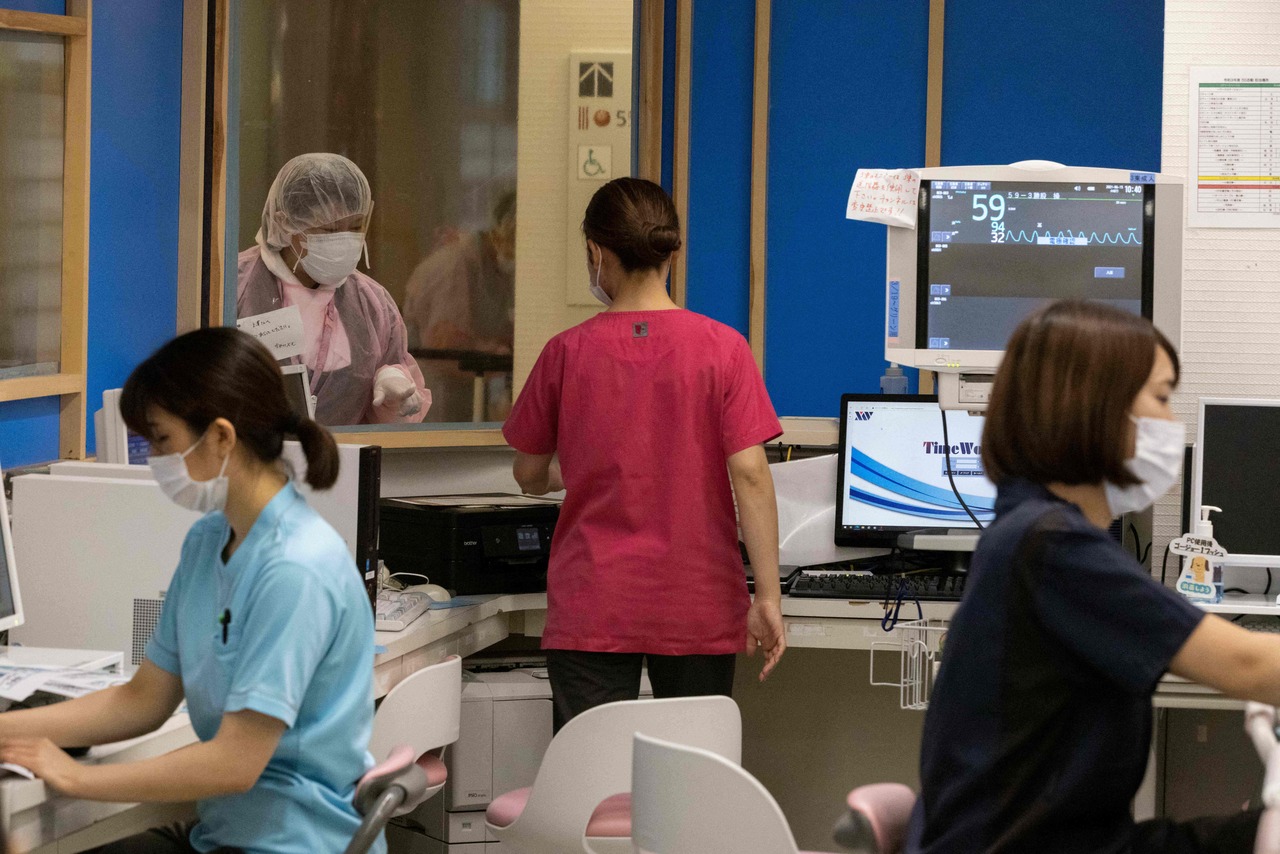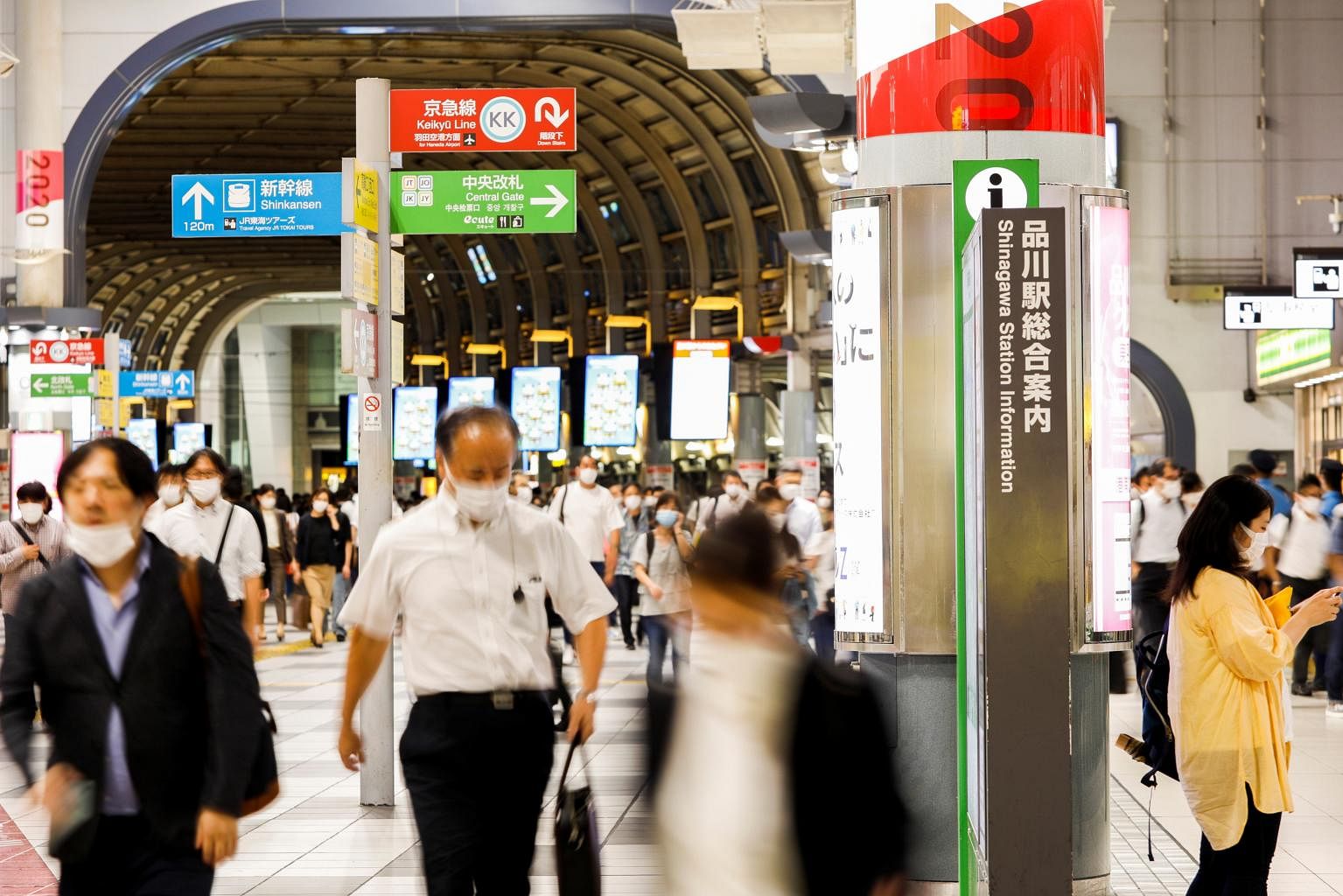Olympic bubble touted as safe amid Covid-19 surge in Tokyo
Sign up now: Get insights on Asia's fast-moving developments

Outside the Olympic bubble, warnings abound that overburdened medical systems across the country are on the precipice of collapse.
PHOTO: AFP
Follow topic:
TOKYO - A Covid-19 patient, struggling for breath, was turned away by nearly 100 hospitals in Tokyo over a span of eight hours last week before he was finally admitted into one.
The man in his 50s wound up in a hospital 50km away from home - a distance that spans Singapore's easternmost to westernmost point.
The harrowing tale, which was first reported by broadcaster TBS on Monday (Aug 2), comes as the International Olympic Committee (IOC) is touting the Tokyo Games bubble as one of the safest places from Covid-19 on the planet.
Despite a vigorous daily testing regime, the Games has returned a positive test rate of just 0.02 per cent - or 294 cases - out of the more than 400,000 tests that have been conducted since July 1.
The relentless and merciless surge of Covid-19 outside the Olympic bubble, driven by the Delta variant, has led the IOC to warn visiting delegations of the risk of infection if they were to break playbook rules.
The underlying message is clear. While the playbook was devised to ease concerns among the Japanese that foreigners will bring in Covid-19, the rules now offer the best protection for visiting delegations against bringing the virus back home.
Outside the Olympic bubble, warnings abound that overburdened medical systems across the country are on the precipice of collapse. But nowhere is the situation more acute than in Tokyo in the fifth wave.
Against this backdrop, doctors who have volunteered their services for the Games are considering dropping out.
"While I want to support the Olympics as a sports fan, as a doctor I must prioritise the medical crisis that is unfolding at my hospital," Dr Taketomo Omomo of the Heisei Tateishi Hospital in Tokyo told public broadcaster NHK. "I fear my absence will worsen the burden when it should be all hands on deck."
More than half of Covid-19 patients who are now recuperating at home cannot be admitted into hospital even if they call for an ambulance, media reports said.
Tokyo Metropolitan Government data on Tuesday (Aug 3) showed that 14,019 were recovering at home - a number previously unseen in the pandemic - while 8,417 people were "awaiting guidance" on whether they should be admitted into hospital.
Prime Minister Yoshihide Suga, who must call a general election within two months, said on Monday that hospitals will on principle only admit the sickest and those who are deemed to be most at risk of developing severe symptoms.
Everyone else - including those with medium symptoms - will recover at home or at designated facilities such as hotels, he said.
"We will secure the necessary beds to ensure severe and at-risk cases can be admitted," Mr Suga said. "Home recuperation will be the standard for others, and we will make sure they can be hospitalised right away if their conditions worsen."
This marks a sharp turnaround in policy, which had previously accommodated a wider range of high-risk patients. This illustrates the shift in age profile as Covid-19 cases fall among the elderly - 77.1 per cent of whom are fully vaccinated - while the middle-aged are developing the worst symptoms.
Japan has to look no further than the fourth wave earlier this year that ravaged the Osaka metropolitan area, with dozens dying at home as the medical system buckled.
But the successes within the Olympic Village also exemplify the inadequacies of the Japanese government to ring-fence Covid-19 in the community. This is unlike other countries, where polymerase chain reaction tests are widely available - sometimes even for free - in addition to an intense contact tracing and isolation regime.
This could be a reason why a majority of cases are unlinked. Further complicating the battle is the slow progress in vaccinations of the general public, with just under 30 per cent of the population fully inoculated.
Japan logged 12,017 cases on Tuesday, with Tokyo recording its third-highest one-day tally with 3,709 cases. Seven prefectures broke their daily records, including Saitama with 1,053 cases and Okinawa with 467 cases.

Okinawa, meanwhile, has the worst proportion of cases, with 171.4 infected per 100,000 residents in the past week. Governor Denny Tamaki asked people to thoroughly refrain from going out.
This comes despite a state of emergency having been in place in Tokyo since July 12, and in Okinawa since May 23. The emergency was expanded to Chiba, Kanagawa, Saitama and Osaka on Monday.
Another five areas - Hokkaido, Ishikawa, Kyoto, Hyogo and Fukuoka - also came under lighter "quasi-emergency" curbs from Monday, with measures to expire on Aug 31 in all 11 areas.
Governors of rural regions expressed alarm at the surge in a National Governors' Association meeting on Sunday, with leaders of Fukui, Miyazaki and Ibaraki prefectures calling for a nationwide state of emergency to send a stronger message.
Still, airlines are reporting a surge in domestic flight bookings this month. While still lower than pre-pandemic days, bookings are up by about 50 per cent from August last year - when there was no emergency in place.

Given the dwindling efficacy of a state of emergency, politicians, including Mr Hakubun Shimomura, the policy chief of the ruling Liberal Democratic Party, have said it was high time for the Diet to debate changes to existing laws to allow blanket lockdowns.
Osaka Governor Hirofumi Yoshimura warned on Monday of the "biggest crisis", adding: "A tsunami may well be coming."

